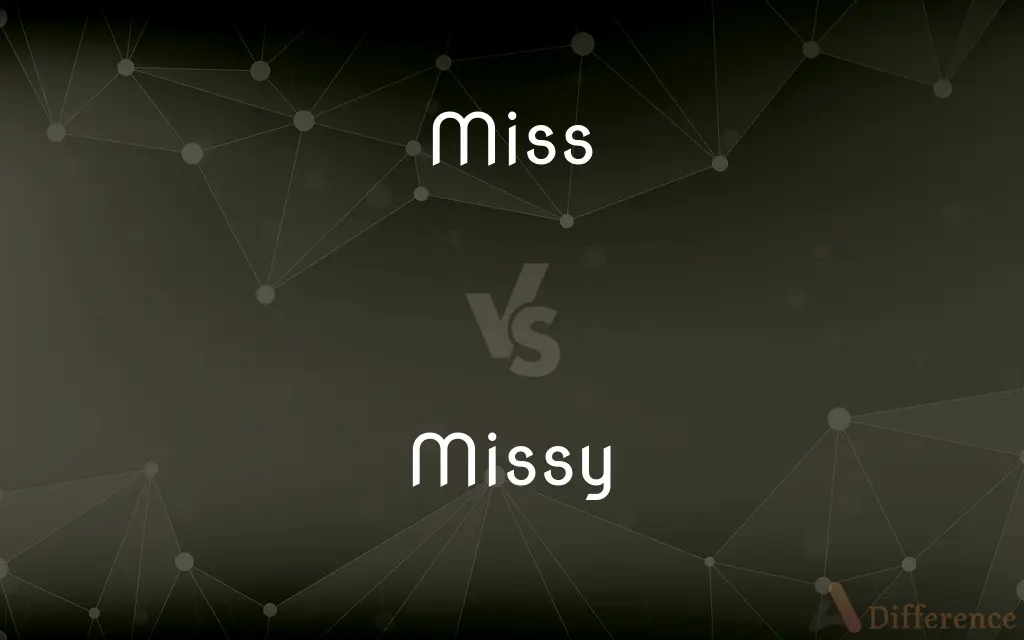Miss vs. Missy — What's the Difference?
Edited by Tayyaba Rehman — By Urooj Arif — Updated on April 3, 2024
"Miss" is a formal title for an unmarried woman, while "Missy" is an informal, affectionate term often used for young girls.

Difference Between Miss and Missy
Table of Contents
ADVERTISEMENT
Key Differences
"Miss" serves as a formal address for unmarried women, regardless of their age, and is often used in professional and formal settings. This title precedes the last name or occasionally the first name, indicating respect and social courtesy without specifying marital status. On the other hand, "Missy" is a diminutive or pet form of "Miss," typically used in a more casual, familial, or affectionate context. It's often directed towards young girls or as a playful address among elders, conveying a sense of warmth and familiarity rather than formal respect.
While "Miss" is widely accepted and used in formal documents, official correspondences, and when meeting someone for the first time, "Missy" is reserved for personal interactions. The use of "Missy" can imply a close relationship or fondness, and in some cases, it may be used condescendingly among elders, depending on the tone and context. This highlights the difference in the level of formality and intimacy conveyed by each term.
Historically, "Miss" has been an essential part of social etiquette, serving as a default title for women, particularly in the English-speaking world. Its usage reflects societal norms and the importance of titles in conveying respect and hierarchy. "Missy," however, stems from endearing language, often used within families or close social circles, and lacks the formal etiquette associated with "Miss." This distinction underscores the evolution of language in reflecting social relationships and status.
In terms of usage, "Miss" is expected in professional environments, such as workplaces, schools, or in any formal communication. It acknowledges the individual's status in a neutral and respectful manner. Conversely, "Missy" is predominantly used in casual conversations, and its use in formal settings could be deemed inappropriate or overly familiar, demonstrating how context influences the appropriateness of these terms.
The choice between "Miss" and "Missy" thus depends on the relationship between the individuals involved and the setting of their interaction. Recognizing when to use each term appropriately can facilitate social interactions, reflecting an understanding of social cues and respect for personal boundaries.
ADVERTISEMENT
Comparison Chart
Formality
Formal title
Informal, affectionate nickname
Usage
Professional and official contexts
Casual or familial contexts
Connotation
Respect and courtesy
Familiarity, affection, or condescension
Applicability
Unmarried women of any age
Typically young girls or in playful adult use
Historical Context
Long-standing social etiquette
Evolved from affectionate family language
Compare with Definitions
Miss
A formal address for unmarried women.
Miss Smith is our new manager.
Missy
An informal nickname, often for young girls.
Come here, Missy, and see what I've got for you!
Miss
Indicates a neutral stance on marital status.
The application form asks for a title: Ms., Miss, Mrs., or Mr.
Missy
Used to express affection or familiarity.
My niece, Missy, loves to paint.
Miss
Reflects social etiquette and hierarchy.
Students, please address your teachers as Mr., Mrs., or Miss.
Missy
Reflects a casual, non-professional tone.
Hey Missy, are you ready to go to the park?
Miss
Used in professional and respectful contexts.
Please direct your questions to Miss Johnson.
Missy
Can imply a close relationship.
Only my family calls me Missy.
Miss
Widely accepted in formal communication.
Miss Lee will be your point of contact.
Missy
May be viewed as condescending in some adult contexts.
I'm not a child, so please don't call me Missy.
Miss
Miss (pronounced ) is an English language honorific traditionally used only for an unmarried woman (not using another title such as "Doctor" or "Dame"). Originating in the 17th century, it is a contraction of mistress, which was used for all women.
Missy
Missy or Missie is a feminine first name, often a short form of Melissa.
Miss
To fail to hit, reach, catch, or otherwise make contact with
He swung at and missed the ball. The winger missed the pass. The ball missed the basket.
Missy
Used as a familiar term of address for a young woman or girl.
Miss
To be too late for or fail to meet (a train, for example).
Missy
A young female, or miss; as a term of mild disparagement, typically used jokingly or rebukingly.
That's enough out of you, missy!
Miss
To fail to perceive, experience, or understand
I missed my favorite TV show last night. You completely missed the point of the film.
Missy
A female nurse.
Miss
To fail to accomplish or achieve
Just missed setting a new record.
Missy
Girlish; effeminate; sentimental.
Miss
To fail to attend or perform
Never missed a day of work.
Missy
Of, or pertaining to, female clothing or clothing sizes.
Miss
To fail to answer correctly
Missed three questions on the test.
Missy
See Misy.
Miss
To fail to benefit from; let slip
Miss a chance.
Missy
An affectionate, or contemptuous, form of miss; a young girl; a miss.
Miss
To escape or avoid
We took a different way and missed the traffic jam.
Missy
A young woman;
A young lady of 18
Miss
To discover the absence or loss of
I missed my book after getting off the bus.
Miss
To be without; lack
A cart that is missing a wheel.
Miss
To feel the lack or loss of
Do you miss your family?.
Miss
To fail to hit or otherwise make contact with something
Took a shot near the goal and missed.
Miss
To be unsuccessful; fail
A money-making scheme that can't miss.
Miss
To misfire, as an internal-combustion engine.
Miss
A failure to hit or make contact with something.
Miss
A failure to be successful
The new movie was a miss.
Miss
The misfiring of an engine.
Miss
Miss Used as a courtesy title before the surname or full name of a girl or single woman.
Miss
Used as a form of polite address for a girl or young woman
I beg your pardon, miss.
Miss
A young unmarried woman.
Miss
Miss Used in informal titles for a young woman to indicate the epitomizing of an attribute or activity
Miss Organization.
Miss Opera.
Miss
Mis·ses A series of clothing sizes for women and girls of average height and proportions.
Miss
(ambitransitive) To fail to hit.
I missed the target.
I tried to kick the ball, but missed.
Miss
(transitive) To fail to achieve or attain.
To miss an opportunity
Miss
(transitive) To avoid; to escape.
The car just missed hitting a passer-by.
Miss
(transitive) To become aware of the loss or absence of; to feel the want or need of, sometimes with regret.
I miss you! Come home soon!
Miss
(transitive) To fail to understand;
Miss the joke
Miss
(transitive) To fail to notice; to have a shortcoming of perception; overlook.
So I'm just going over my early notes, see if I missed anything.
Miss
(transitive) To fail to attend.
Joe missed the meeting this morning.
Miss
(transitive) To be late for something (a means of transportation, a deadline, etc.).
I missed the plane!
Miss
(transitive) To be wanting; to lack something that should be present.
The car is missing essential features.
Miss
To spare someone of something unwanted or undesirable.
Miss me with that nonsense!
Miss
To fail to help the hand of a player.
Player A: J7. Player B: Q6. Table: 283. The flop missed both players!
Miss
(sports) To fail to score (a goal).
Miss
To go wrong; to err.
Miss
To be absent, deficient, or wanting.
Miss
A failure to hit.
Miss
A failure to obtain or accomplish.
Miss
An act of avoidance give}}
I think I’ll give the meeting a miss.
Miss
(computing) The situation where an item is not found in a cache and therefore needs to be explicitly loaded.
Miss
A title of respect for a young woman (usually unmarried) with or without a name used.
You may sit here, miss.
You may sit here, Miss Jones.
Miss
An unmarried woman; a girl.
Miss
A kept woman; a mistress.
Miss
(card games) In the game of three-card loo, an extra hand, dealt on the table, which may be substituted for the hand dealt to a player.
Miss
A title of courtesy prefixed to the name of a girl or a woman who has not been married. See Mistress, 5.
Miss
A young unmarried woman or a girl; as, she is a miss of sixteen.
Gay vanity, with smiles and kisses,Was busy 'mongst the maids and misses.
Miss
A kept mistress. See Mistress, 4.
Miss
In the game of three-card loo, an extra hand, dealt on the table, which may be substituted for the hand dealt to a player.
Miss
The act of missing; failure to hit, reach, find, obtain, etc.
Miss
Loss; want; felt absence.
There will be no great miss of those which are lost.
Miss
Mistake; error; fault.
He did without any great miss in the hardest points of grammar.
Miss
Harm from mistake.
Miss
To fail of hitting, reaching, getting, finding, seeing, hearing, etc.; as, to miss the mark one shoots at; to miss the train by being late; to miss opportunites of getting knowledge; to miss the point or meaning of something said.
When a man misses his great end, happiness, he will acknowledge he judged not right.
Miss
To omit; to fail to have or to do; to get without; to dispense with; - now seldom applied to persons.
She would never miss, one day,A walk so fine, a sight so gay.
We cannot miss him; he does make our fire,Fetch in our wood.
Miss
To discover the absence or omission of; to feel the want of; to mourn the loss of; to want; as, to miss an absent loved one.
Neither missed we anything . . . Nothing was missed of all that pertained unto him.
What by me thou hast lost, thou least shalt miss.
Miss
To fail to hit; to fly wide; to deviate from the true direction.
Men observe when things hit, and not when they miss.
Flying bullets now,To execute his rage, appear too slow;They miss, or sweep but common souls away.
Miss
To fail to obtain, learn, or find; - with of.
Upon the least reflection, we can not miss of them.
Miss
To go wrong; to err.
Amongst the angels, a whole legionOf wicked sprites did fall from happy bliss;What wonder then if one, of women all, did miss?
Miss
To be absent, deficient, or wanting.
What here shall miss, our toil shall strive to mend.
Miss
A young woman;
A young lady of 18
Miss
A failure to hit (or meet or find etc)
Miss
Fail to perceive or to catch with the senses or the mind;
I missed that remark
She missed his point
We lost part of what he said
Miss
Feel or suffer from the lack of;
He misses his mother
Miss
Fail to attend an event or activity;
I missed the concert
He missed school for a week
Miss
Leave undone or leave out;
How could I miss that typo?
The workers on the conveyor belt miss one out of ten
Miss
Fail to reach or get to;
She missed her train
Miss
Be without;
This soup lacks salt
There is something missing in my jewellery box!
Miss
Fail to reach;
The arrow missed the target
Miss
Be absent;
The child had been missing for a week
Miss
Fail to experience;
Fortunately, I missed the hurricane
Common Curiosities
Can "Missy" be used in a professional setting?
It's generally not appropriate for professional or formal settings due to its informal and affectionate connotations.
Does using "Miss" imply anything about a woman's age or marital status?
While "Miss" indicates that a woman is unmarried, it doesn't necessarily imply anything about her age.
Is "Miss" only for young unmarried women?
No, "Miss" can be used for unmarried women of any age, though some may prefer "Ms." as a more age-neutral title.
Is it disrespectful to call someone "Missy"?
It can be, depending on the context and the individuals' relationship. It's best used when there's a clear understanding of its affectionate intent.
Why might someone prefer not to be called "Missy"?
Elders may find it overly familiar, condescending, or diminishing, especially in contexts where respect and professionalism are expected.
How has the use of "Miss" evolved over time?
"Miss" has maintained its formal status but is now often replaced or supplemented by "Ms." in professional contexts to avoid indicating marital status.
What's the best way to know which title to use?
When in doubt, ask for the individual's preference or default to the more formal option to ensure respect and professionalism.
Is "Missy" a common name or nickname?
Yes, it can also be a given name or nickname, not just a diminutive form of "Miss."
How do cultural differences affect the use of "Miss" and "Missy"?
Cultural norms and language influence how these terms are perceived and used, with variations in formality and familiarity across different contexts.
Can men have a similar title to "Miss"?
Men are traditionally addressed as "Mr." regardless of marital status, lacking a direct equivalent to "Miss."
Share Your Discovery

Previous Comparison
Claymore vs. Rapier
Next Comparison
Offense vs. SinAuthor Spotlight
Written by
Urooj ArifUrooj is a skilled content writer at Ask Difference, known for her exceptional ability to simplify complex topics into engaging and informative content. With a passion for research and a flair for clear, concise writing, she consistently delivers articles that resonate with our diverse audience.
Edited by
Tayyaba RehmanTayyaba Rehman is a distinguished writer, currently serving as a primary contributor to askdifference.com. As a researcher in semantics and etymology, Tayyaba's passion for the complexity of languages and their distinctions has found a perfect home on the platform. Tayyaba delves into the intricacies of language, distinguishing between commonly confused words and phrases, thereby providing clarity for readers worldwide.















































